
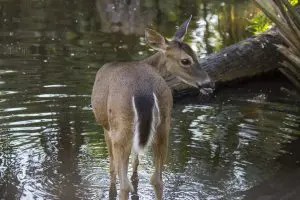
Our Zoo is home to several species local to Florida, including white-tailed deer!
As a Florida Zoo, we’re fortunate to share our soil with some fascinating critters, including cranes, sea turtles, black bears, anoles and many more. Each and every one of these animals plays an important role in their natural habitat, maintaining the balance of their ecosystems.
And whether we realize it or not, these ecosystems bear an impact on our human lives, our food and our wellbeing, too. Like good neighbors, we should learn to create a world in which we can both thrive.
After all—it’s their home, too!
What does it mean to “coexist” with local wildlife?
We’ve seen the negative effects people can have on the wildlife around them, from wildlife trafficking victims who have come through our doors, to some of our Sea Turtle Healing Center patients dealing with boat strike wounds. But we’ve also seen the good people can do to help their local wildlife.
So, what can we do to reduce these challenges? While no singular person can solve the root causes of these problems, we can still take the right steps toward living coexisting with wildlife.
Help out your sea turtle friends:
Who doesn’t love a beach day? While the ocean is a beautiful, free resource for us to enjoy, sea turtles need our help to keep their home free of debris.
According to the Sea Turtle Conservancy, plastic pollution and marine debris including fishing line and single-use plastics are among the leading causes of sea turtle fatalities worldwide, with over 1 million deaths each year.
In the ocean, sea turtles often mistake debris and man-made material for potential food, eating the plastic fragments and potentially damaging their gastrointestinal lining. This was the case for several of our Sea Turtle Healing Center’s patients, including Horchata and Belle.
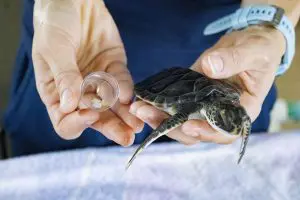
Former sea turtle patient Belle, who ingested several pieces of plastic, unfortunately passed away from the complications.
We’ve also taken in several patients, like LJ, who suffered from boat strike injuries. According to the Florida Fish and Wildlife Conservation Commission (FWC), Florida is the boating capital of the world, making it even more important to watch out for wildlife on the waters.
Let’s combat these statistics by opting for sustainable bottles, containers and bags instead of plastic ones, cleaning up after ourselves at the beach, slowing the speed of our vessels, and giving their nesting, foraging and mating sites space.
If you encounter a dead, injured or struggling sea turtle in Brevard County, contact the Sea Turtle Preservation Society here or call (321)-206-0646.
Exercise caution around wildlife:
We get it. Spotting animals in their natural habitats can be a thrilling, once-in-a-lifetime opportunity, but we must remember to respect our neighbors’ space.
Take American alligators, for example. These reptiles can be found all over Florida, from the vast Everglades to your local park, with about 1.5 million alligators across the state.
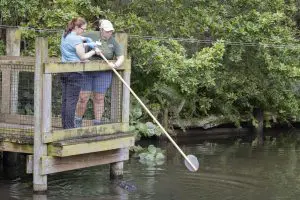
During our alligator encounters, our Herps and Aquatics team provides helpful tips about how to coexist with local gators and the common misconceptions about the species.
While some may assume alligators are hostile animals, known alligator bites are few and far between. Unless they are provoked, alligators tend to mind their business.
Only swim in designated areas and always keep your pet on a leash. When you come across an alligator, keep your distance—never tease or feed them.
The same idea applies to Florida black bears, too. Any type of interaction, whether it’s calling out to bears or feeding them, teaches them to become comfortable with approaching humans. And though black bears are more docile than other bear species, this encouragement leads to more conflict with humans…and their trashcans!
For those living in rural areas, consider switching to bear-proof trashcans designed to keep these fluffy animals from scavenging through your garbage. In fact, our Zoo’s resident bears, Cheyenne, Brody and Betty, have participated in testing the effectiveness of these trashcans over the past few years!
Other tips include avoiding leaving food out for stray animals, cleaning your outdoor grill after use and most importantly—simply leaving wild bears alone.
If you find a sick, orphaned, injured or dead Florida black bear, if you see someone feeding an alligator, or if you find a “nuisance” alligator, please contact Florida Wildlife and Conservation Commission’s Wildlife Alert Hotline at 888-404-FWCC (3922).
Fight back against habitat loss:
Now more than ever, Florida black bears across the state struggle with habitat loss.
As one of the fastest growing states in the U.S., Florida continues to grow its human population each year. When urban development takes over rural land, Florida black bears have fewer places to reside. In fact, many high-traffic roads and highways were built across these bears’ natural habitats, leading them to confuse “our” land with theirs.
Today, car collisions are the primary cause of Florida black bear mortalities. And we’ve seen the effects firsthand. Cubs Fern and Branch were found on the side of the road, stranded after their mother was sadly struck by a car. Now, the siblings live at our Black Bear Rehabilitation Center, growing and learning survival skills ahead of their eventual release.
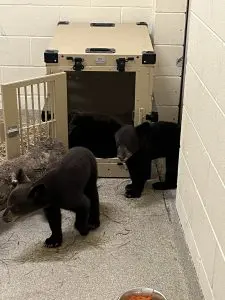
Fern and Branch explore our indoor area.
We can do our best to minimize situations like these by keeping our eyes peeled on major highways and reducing interactions with wild cubs.
Consider learning more about the important work of the Florida Wildlife Corridor Foundation, a nonprofit dedicated to protecting Florida’s wilderness. Backed by the Florida Wildlife Corridor Act, the organization educates the public, guards clean water, prevents development on natural lands, and works with developers to create conservation easements, agreements in which sold land is perpetually protected by law.
Never take animals from their natural habitats:
Both locally and worldwide, wildlife trafficking remains one of the most profitable crime industries, robbing natural habitats of the animals and plants that support their ecosystems.
Whether it’s exotic animals, like primates and sloths, or local wildlife, it goes without saying that an animal should never be taken from their home. A drastic change in environment for a prolonged period of time, especially when an animal is young, can permanently damage their ability to thrive in their natural habitat again.
Peach, our Zoo’s fallow deer resident, was found as a baby without her mother when a person decided to take her in. Instead of notifying FWC, Peach was kept at someone’s home, becoming acclimated to human care at a very young age. When she was confiscated by FWC, she was deemed to no longer be able to thrive on her own again. It was also discovered that Peach was actually a non-native species to Florida as an axis deer. These factors led to her joining our Zoo.
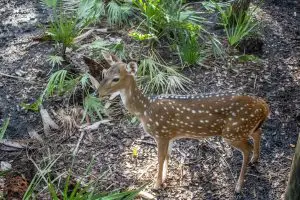
Peach arrived at our Zoo at just three months old.
While we’re overjoyed to have Peach as one of our residents, it’s important to leave decisions about a wild animal’s future to wildlife officials. Situations like Peach’s perpetuate wildlife trafficking, even if you may be trying to help.
Instead, call Florida Wildlife and Conservation Commission’s Wildlife Alert Hotline at 888-404-FWCC (3922).
Lend a Helping Hand:
Lastly, you can give back to your wildlife by volunteering with local environmental organizations. Our Zoo’s Restore Our Shores team has been working to boost the health of the Indian River Lagoon for over a decade, helping native populations like manatees, oysters, mangroves, seagrass and more.
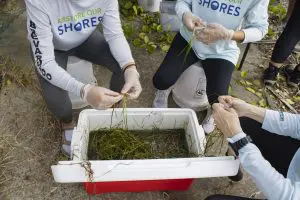
Our Restore Our Shores team routinely plants seagrass across sites in the Indian River Lagoon.
Working Together:
We hope you learned more about how you can help your local community and animal friends! If you’d like to learn more ways to be a better steward to your environment, check out more of our tips.
Together, we can peacefully coexist with our local wildlife to ensure they continue to live their best lives in their natural habitats.
Brevard Zoo is an independent, not-for-profit organization that receives no recurring government funding for our operating costs. Your generous support enables us to continue to serve our community and continue our vital animal wellness, education and conservation programs.